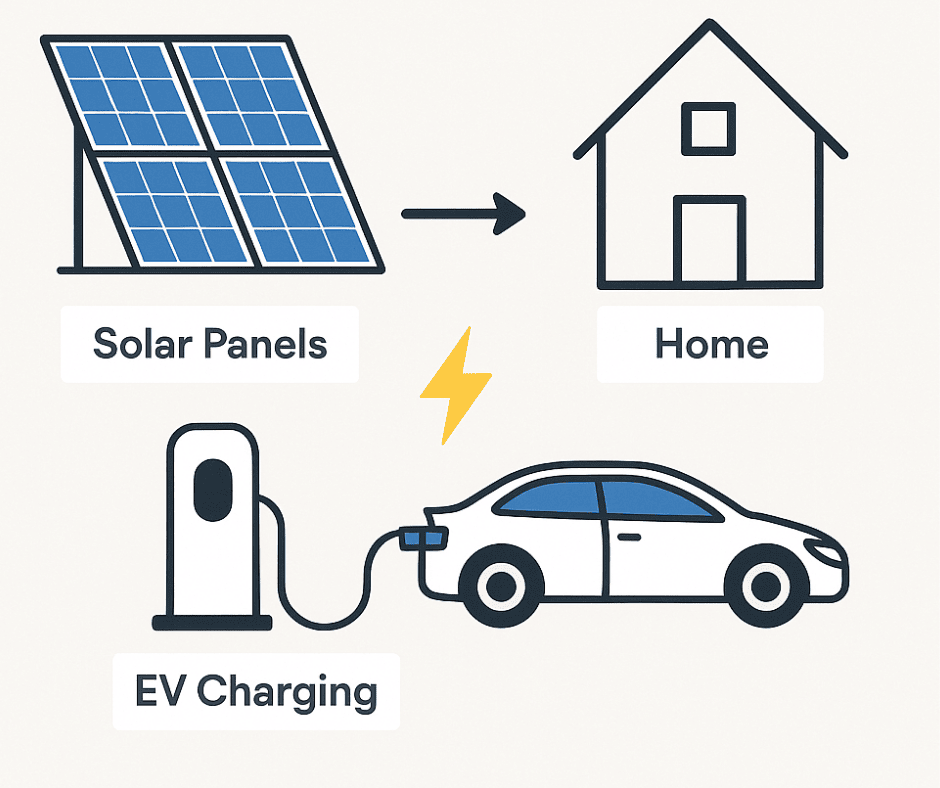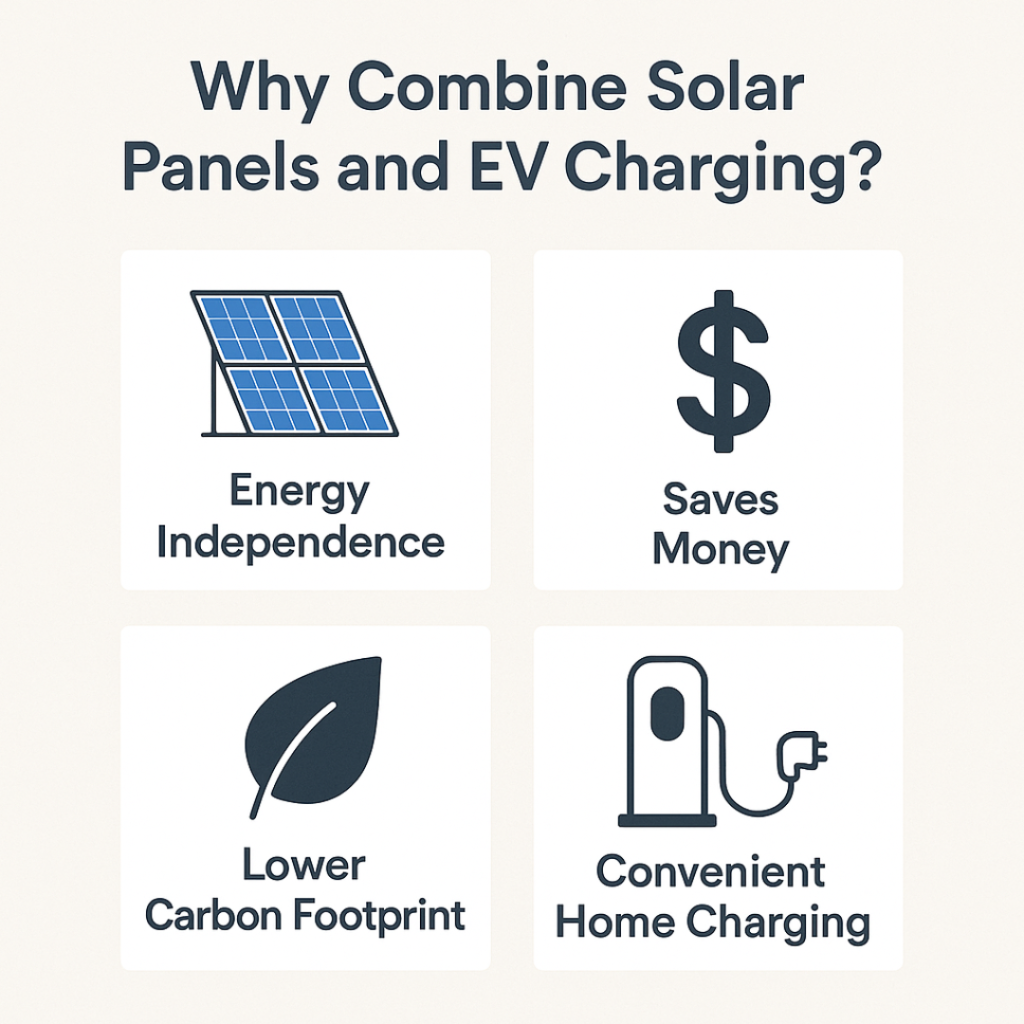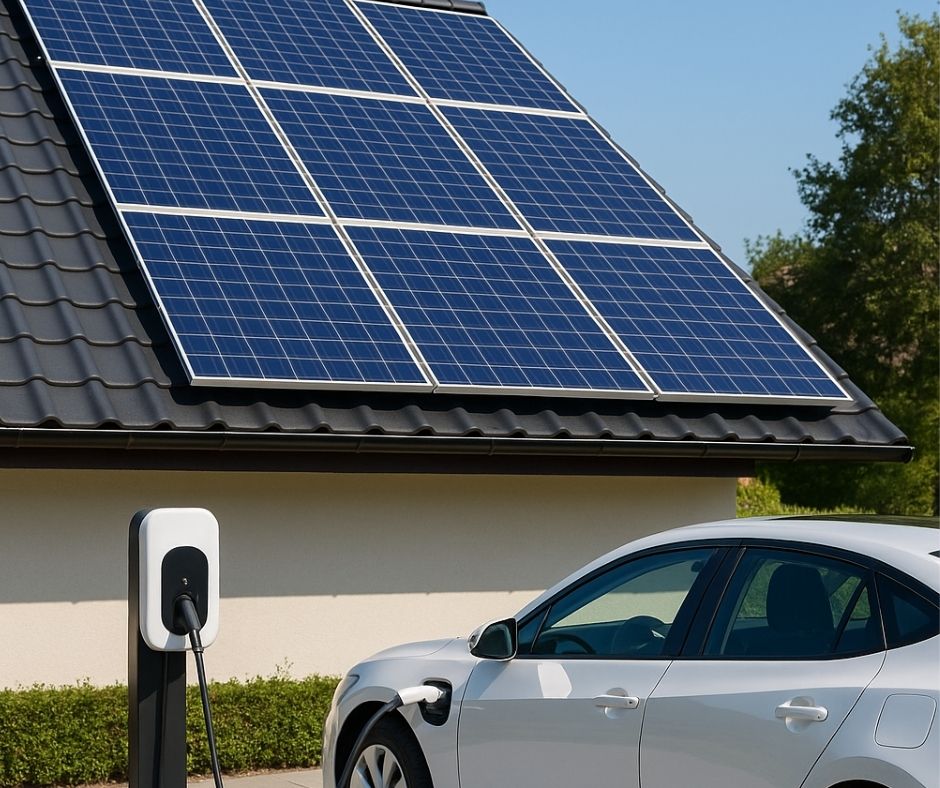As electric vehicles become more popular and solar technology continues to advance, many homeowners are exploring how to combine the two for a smarter, cleaner lifestyle.
Pairing solar panels with an EV charger doesn’t just make environmental sense—it can also increase your energy independence and reduce long-term costs.
In this guide, we’ll explore why this combination works so well, what your options are, and how to get the most out of your investment.
Why Combining Solar and EV Charging Stations Makes Sense

Pairing solar energy with an EV charger is more than just a smart home upgrade—it’s a step toward long-term sustainability and self-sufficiency.
As EV charging becomes more common and solar panels continue to grow in efficiency, combining these systems allows homeowners to make the most of renewable energy while optimizing cost, convenience, and environmental impact.
Speaking with Saguaro Solar, a Tucson-based solar energy company that serves southern Arizona, we learned about a great rise in popularity of combined solar panel and electric vehicle charger installation.
Energy Independence
By installing a solar energy system alongside an EV charger at home, you gain greater energy independence. Rather than relying solely on the grid, you can charge your EV with solar, using power generated by your solar array.
As the availability of electric vehicle charging stations along transit routes increases, having a station at your house linked to your solar panels makes saving money and driving an electric car
This setup allows you to manage your home energy more efficiently, reduce vulnerability to utility rate hikes, and avoid potential grid outages—especially when your system includes battery storage to power your home appliances during off-peak hours or blackouts.
Solar-Powered EV Charging Saves Money
Combining solar power with EV charging significantly reduces your electricity bills. The ability to charge your EV with excess solar energy lowers your dependence on costly utility rates, especially during peak hours.
While installing a solar system and EV charger requires upfront investment, the long-term cost savings are substantial. Plus, smart EV charging systems help optimize energy usage, ensuring that you charge your car when solar production is high.
Rebates and Solar Incentives
Federal, state, and local solar incentives make it more affordable to install EV charging equipment and solar panels together. You may qualify for tax credits, utility rebates, and other programs that support clean energy adoption.
Some regions even offer specific perks for homeowners who combine solar and EV charger installation, helping to offset the upfront costs. These financial benefits can make a big difference in how quickly your system pays for itself.
Combining solar credits with other green energy tax deductions such as those from solar window film installation allow you to maximally leverage available rebates and achieve a substantial ROI from savings via these upgrades.
Lower Carbon Footprint
Using solar power to charge your electric vehicle dramatically cuts your carbon footprint. When you rely on the grid, part of your electricity often comes from fossil fuels, but using solar panels to fuel your EV at home supports a transition to clean energy.
A solar-powered EV system reduces greenhouse gas emissions and supports a more sustainable lifestyle—one that aligns with a broader movement toward renewable energy solutions.
Convenient Home Charging for Your Electric Vehicle
Installing a charging station at home powered by solar energy means never having to detour for a charge again. A level 2 EV charger ensures faster charging time, and when combined with home solar, you enjoy seamless, cost-effective refueling.
This is especially valuable for EV drivers who prefer the convenience of charging an EV at home with solar overnight or during the day when solar production is high.
Adds Value to Your Home
A home with solar power and a dedicated EV charging station is increasingly appealing to today’s eco-conscious buyers. As demand for solar and EV charging solutions grows, so does the perceived value of properties that include them.
By investing in a solar EV charging setup, you not only reduce your energy consumption but also boost resale potential, making your home more future-ready in a competitive real estate market.

Your Options for Installing Solar Power To Charge Your EV
When it comes to integrating solar panels and EV chargers, there’s no one-size-fits-all solution.
Your setup can range from a small solar system designed solely to charge your EV to a robust home solar configuration that powers your entire house, including your EV charging station at home.
For full flexibility, consider a whole-house solar energy system with battery storage. This allows you to store excess solar energy, power your home appliances, and charge your EV, even when solar production is low.
Smart power management systems further optimize energy usage, ensuring your EV charger and household loads draw power efficiently.
More advanced options include bidirectional charging, which allows your electric vehicle to send energy back to your home, creating a dynamic, resilient energy system that maximizes every watt of solar power.
Installing an EV Charger and Solar System: Possible Complications
While solar-powered EV charging offers impressive benefits, it’s important to understand potential complications before making an investment. From equipment limitations to environmental constraints, not every setup works flawlessly out of the box.
Taking time to evaluate your specific charging needs, property layout, and system capabilities can help ensure you discover how solar and EV solutions will realistically function together for your lifestyle and location.
Variable Energy Production Without a Battery Storage System
Solar panels generate the most energy during daylight hours, but your electric vehicle charging needs may not always align with this schedule. Without a battery to power your home and power your EV at night, you may have to rely on the grid.
A storage system helps bridge the gap when solar energy production drops—especially in cloudy weather or during seasonal changes.
Initial Cost
The upfront price of installing solar and an EV charging system can be high, especially if you opt for a solar PV system with smart controls or backup storage. You’ll also need to factor in EV charging stations cost, particularly if you plan to add advanced features.
Fortunately, long-term savings and the use of solar energy to reduce utility dependence often offset initial expenses over time.
Underestimating Your Energy and Charging Needs
Choosing the right number of solar panels is essential. Homeowners often underestimate charging requirements, especially when charging your EV is combined with running everyday appliances.
The energy needed to charge an EV depends on battery size, driving habits, and charger type. If you’re using an existing solar setup, you may need to size your solar array differently to support EV charging with solar reliably.
Insufficient Sunlight Exposure
Not every roof or property is ideal for solar panels to charge your car at home. If shading, orientation, or local climate limits sun access, even a reliable solar system may fall short.
Ensure your solar panels are placed for maximum exposure year-round. If not, solar and EV charging work together less efficiently, and you may not achieve the energy independence you’re aiming for.
Inefficient System Setup
To make EV charging with solar effective, your system must be well-integrated. If your EV chargers and solar panels don’t communicate properly or aren’t scaled correctly, you may struggle to keep up with demand.
EV chargers make a significant difference when optimized with intelligent controls. Whether you’re installing an EV charger or upgrading to a solar-powered EV charging setup, a poor design can lead to energy waste and reduced savings.
Integrating Solar Panels and an EV Charger: Best Practices
To maximize performance, efficiency, and long-term savings, thoughtful planning is key when using solar energy to power electric vehicle charging stations.
Start by consulting with professionals who understand how EV charging integrates with solar systems. Here are some best practices:
- Assess your charging needs and daily driving habits to determine the appropriate charger type and solar output.
- Install a Level 2 EV charger for faster, more efficient home charging.
- Position panels for optimal sun exposure and minimal shading.
- Use smart energy management tools to prioritize charging your EV at home when solar output is highest.
- Plan for future scalability, especially if you may add another electric vehicle or increase home energy demands.
Proper integration ensures your solar and EV charging work in harmony for years to come.
Combining Solar Energy and EV Chargers: Is It Right for You?
If you value sustainability, long-term cost savings, and energy independence, pairing solar energy and EV charging is a smart move.
Whether you’re new to clean tech or expanding your existing system, this integrated approach lets you power both your home and EV with renewable energy.
With thoughtful planning and the right setup, you’ll reduce your footprint and enjoy the convenience of charging an EV at home—the green way.
Frequently Asked Questions
Is it possible to charge an EV with solar panels?
Yes, you can charge an EV with solar panels installed at home. As long as your solar panels work efficiently and are properly sized, they can generate enough clean energy to power your vehicle—often reducing or eliminating reliance on the grid.
Are solar panels worth it with an EV?
Absolutely. Pairing solar panels and EV charging reduces your carbon footprint and long-term electricity costs. Solar energy can help you become more energy independent while providing a renewable, cost-effective way to charge your electric vehicle.
How big a solar panel do I need to charge an EV?
To fully charge your EV with solar, most drivers need around 12 solar panels, depending on your EV’s battery size, driving habits, and location. The right system ensures you generate enough power without overloading your setup or underproducing.
How long does it take to charge an electric car with solar panels?
Charging time depends on your EV, the charger type, and your solar energy output. With a Level 2 charger and a well-sized solar system, you can fully charge most electric cars in 6–10 hours using sunlight alone—ideal for overnight or daytime home charging.


